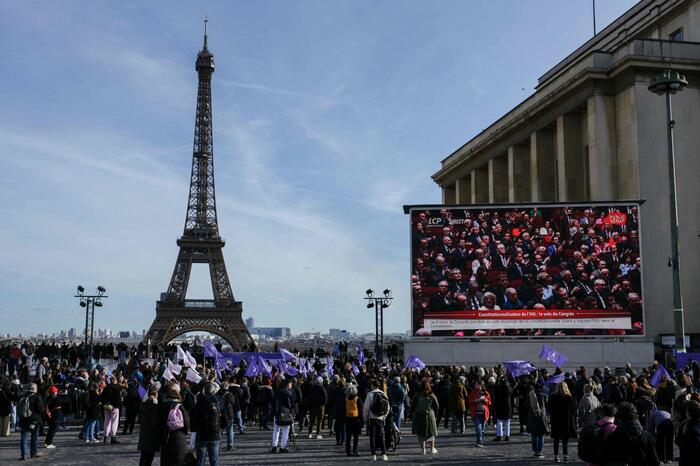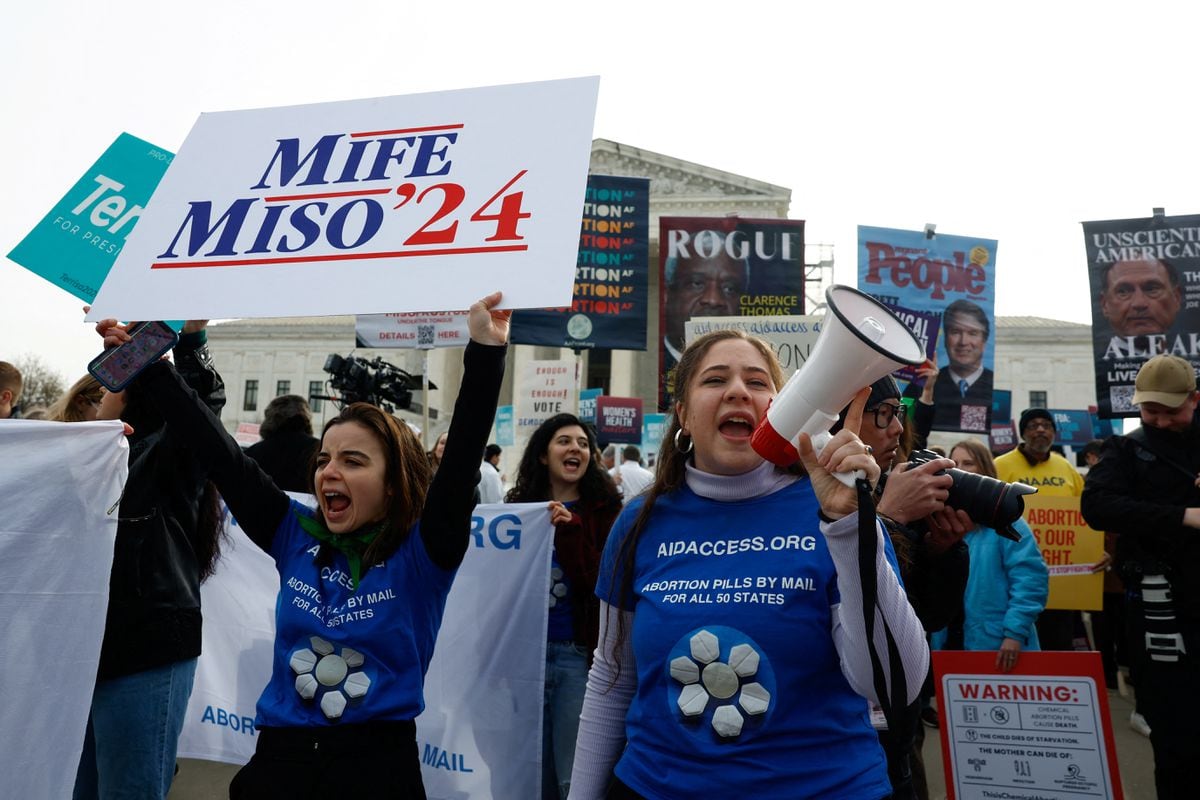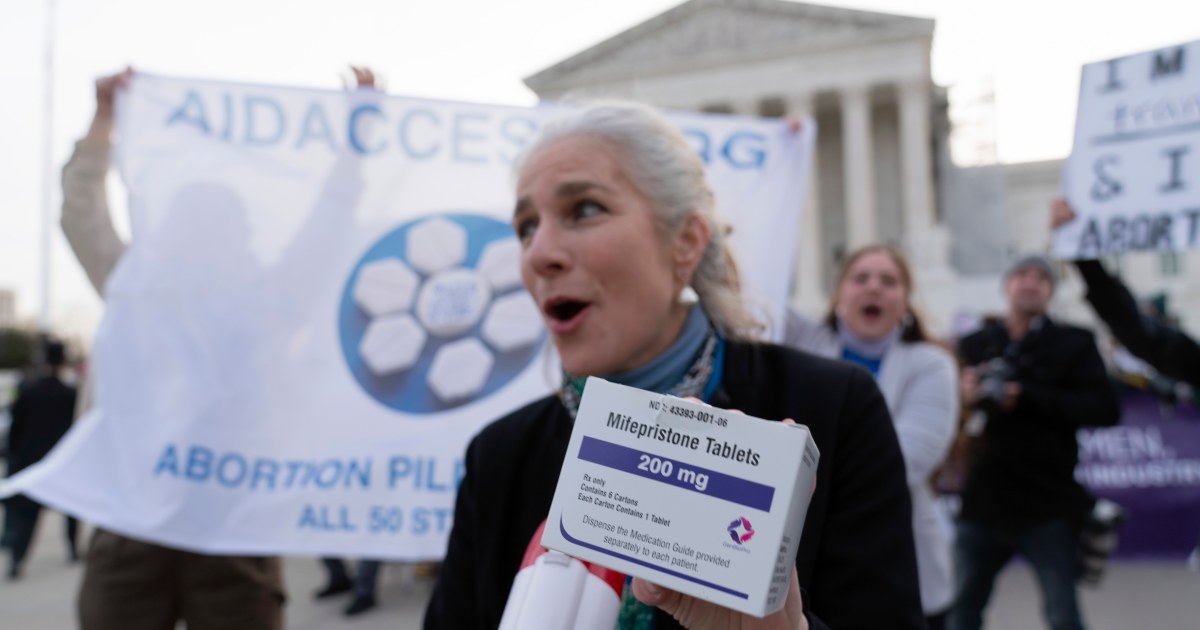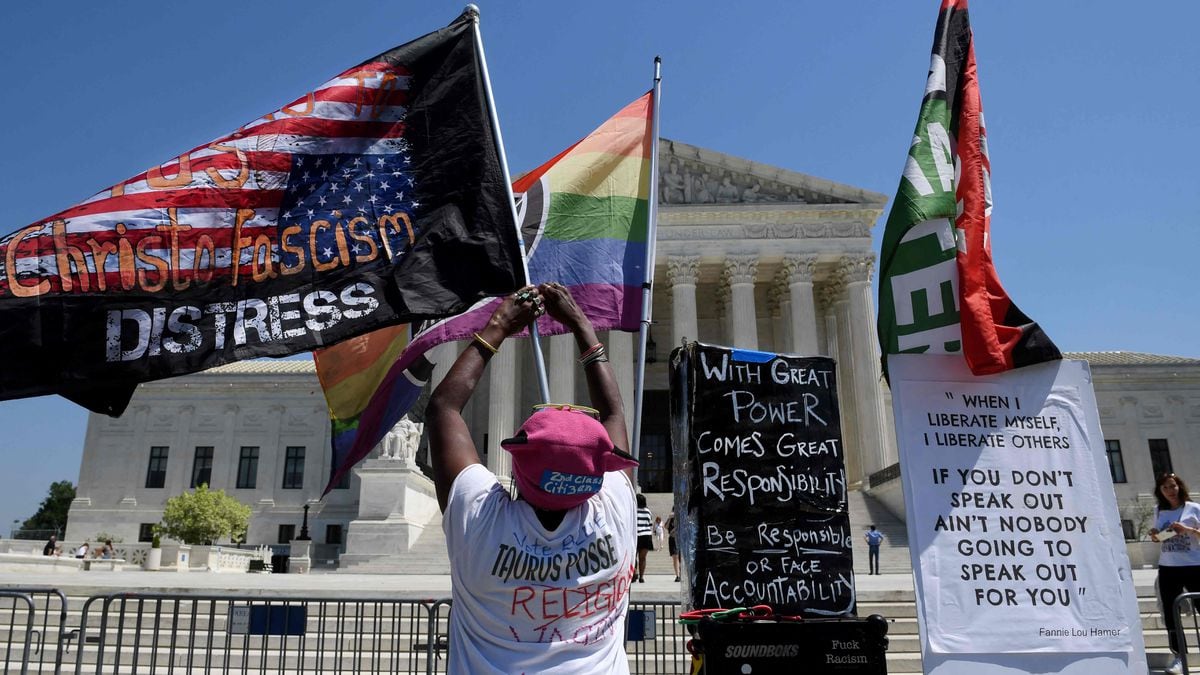How many people would be affected by banning abortion in the US?
2:41
(CNN) --
The contrast between the theoretical legal bubble of the Supreme Court chamber and the confused and divided nation shaken by the destabilizing decisions of its conservative majority has never been starker.
New political and legal battles are being waged after the court struck down the constitutional right to abortion, striking down the landmark Roe v.
Wade, which goes against the majority public opinion that supports abortion.
The political system and national cohesion pressured by the pandemic and ideological divisions are reaching a breaking point.
Millions of Americans are unsure of their health care rights and options and unclear about the complex medical, legal, and ethical issues suddenly thrown up by the court's monumental decision.
For opponents of abortion, who see the termination of a pregnancy as equivalent to the murder of a fetus, these are the inevitable consequences of correcting a moral wrong.
But pro-choice Americans living in states where abortion is now illegal feel victimized by unacceptable government interference in their decisions about their health and their families.
Regardless of their philosophical positions on terminating a pregnancy, leaders on both sides of the political spectrum are grappling with government challenges caused by the sudden end of legal abortion in some states.
Republicans who have long promised to ban the procedure face demands to provide more social services to the people they coerce and their babies.
Democrats are considering how to bolster abortion rights in blue states in the face of a possible push by future Republican majorities in Washington for a national abortion ban.
Tensions are already flaring between states that are against and for abortion rights.
Big companies are grappling with how to help workers obtain reproductive services and avoid political fallout in red states.
The abortion rights movement is beginning to fight back, and the White House is balancing demands from progressives that President Joe Biden act aggressively to safeguard abortion rights with limits on his executive power.
And the implications for the midterm elections and the transformed presidential race of 2024 are growing.
advertising
Perhaps America will finally strike some shaky footing on abortion.
But so far, local, state and national leaders have been affected by the court's decision.
Years of fragmented abortion practices and confusion lie ahead.
What does it mean that the US Supreme Court has overturned Roe v.
Wade?
Why did the Supreme Court overturn the Roe v Wade ruling that decriminalized abortion?
The consequences of the Court's decision on abortion
Justice Samuel Alito argued last week that he and his conservative colleagues could not "pretend to know" how the political system would respond to their judicial earthquake, but said the authority to regulate abortion must rest with the people.
But the rest of the country has to live with what it forged in its majority opinion and the consequences of the sudden withdrawal of an established constitutional right, regardless of individual views on abortion.
Four days later, the words of Chief Justice John Roberts, coinciding with the court's decision last week, ring true.
Despite his own opposition to abortion, Roberts argued that a less abrupt court move that did not overturn Roe v.
Wade would be "noticeably less disturbing".
However, the chaos unleashed since Friday is in keeping with the temperamental underpinnings of Trumpism and the shred-and-see spirit of the former president who built the court's new right-wing majority and whose legacy will be defined in part by the next fight for abortion.
And the chaos unleashed may be a foretaste of years to come with the court apparently determined to set a crushing precedent on social issues, financial regulation, gun laws, religion in the public square and the government's power to regulate the environment.
"The irony is that one of the bases of Alito's decision was that ... it was time to end the controversy. He has done the exact opposite," said Nancy Gertner, a retired district judge nominated by former President Bill Clinton, on CNN's "Situation Room with Wolf Blitzer."
Legal battles erupt over abortion rights
The practical consequences of the court's decisions are spreading after conservatives celebrated a stunning victory, half a century later, against Roe v.
Wade of 1973 that establishes the constitutional right to abortion.
Meanwhile, liberals erupted in pain and fury as protests spread from outside the Supreme Court building in Washington, and across the country over the weekend.
On Monday, the battle went to court.
In Louisiana, a judge has blocked the state's "trigger law" on abortions, which went into effect just after the Supreme Court ruling.
The lawsuit, filed on behalf of Hope Medical Group for Women and Medical Students for Choice, argued that the bans were unconstitutionally vague.
This was one of the first of countless legal challenges across the country that arose from the Supreme Court's decision.
A Utah judge granted a temporary restraining order to block the state's "activation ban" after the state's Planned Parenthood chapter filed a lawsuit over the weekend.
According to the lawsuit, performing an abortion in that state under the ban would be a second-degree felony in most cases.
There are some exceptions, including for the health of the mother or after rape or incest.
Goodbye to Roe vs.
Wade: the right to abortion in the US is repealed. 1:39
In some other states, however, the laws are even stricter and are likely to create more challenges.
Meanwhile, in South Carolina, a federal judge has lifted the stay placed on the state's 6-week abortion ban, allowing the state to enforce its "beat law."
Ten states now ban or severely restrict the procedure, according to the Guttmacher Institute, a research organization that supports abortion rights.
More are likely to follow suit soon, including Mississippi, Tennessee and Idaho.
But underscoring the national schism, many states are moving quickly to strengthen abortion rights, including California, Minnesota and Washington state, which have Democratic governors.
Some more liberal regions have pledged to act as havens for women from anti-abortion strongholds, a move that could open up a legal quagmire and spark interstate disputes over a core political belief that dates back to the pre-Civil War era.
Illinois Governor JB Pritzker, a Democrat, defended his state's status as a destination for women who have had their abortion rights taken away.
“This is a fundamental right.
Everybody should have it," Pritzker told CNN's Erin Burnett.
There are also thorny legal issues that officials have not begun to resolve.
For example, how will anti-abortion states enforce their laws?
Will they crack down on women who order abortion pills out of state?
And how will they deal with corporations that fund employee travel for out-of-state care?
And will some of those companies, under pressure from employees, feel the need to move to states where abortion rights are protected?
Some Americans pay a heavy price for the court's decision
As is often the case after massive political clashes that expose the country's divisions, Americans must try to live their lives amidst the fallout.
Friday's decision is causing a great deal of personal uncertainty.
Pregnant people in anti-abortion states now face life crises they may not have faced last week.
Complex questions are being raised about whether some state restrictions on abortion could affect the availability of fertility treatments or could limit doctors' options when treating women after miscarriage.
There have been promises from conservative leaders, like South Dakota Governor Kristi Noem, for example, of financial and emotional support for mothers.
So far, however, there is little detail on the GOP-led states that are least likely to spend on health care and social programs.
This is increasing pressure on the White House to offer federal protections for abortion.
However, in an exclusive interview with CNN's Dana Bash, Vice President Kamala Harris said Monday that the administration was not considering the idea of using federal land for abortion services in or around anti-abortion states.
Such a scheme, and another proposal for the federal government to fund out-of-state trips for women to have abortions, may violate the law.
House Speaker Nancy Pelosi on Monday outlined legislative ideas for fellow Democrats that would make clear that Americans have a constitutional right to travel freely.
The House Speaker also plans to pass legislation enshrining the Roe v.
Wade in law.
But such a measure has no chance of overcoming a Republican filibuster in the Senate.
As government challenges from the Supreme Court bombshell resonate, some politicians feel an opening.
While some Republicans have erred on the side of caution, former Vice President Mike Pence, a potential 2024 presidential candidate, has thrown himself all-out in favor of a national abortion ban.
Seeking to expand his evangelical power base, Pence told Breitbart News last week that he would not rest until "the sanctity of life is restored to the center of American law in every state in the country."
Pence certainly welcomed the opportunity to make news on an issue that has nothing to do with the House select committee investigating the Capitol insurrection, a move that will align rank-and-file Republicans.
His successor as vice president also took into account the future political implications of the decision, presenting a human message that Democrats could use in the next election.
Harris told CNN that "as a former prosecutor who specialized in crimes of violence against women and girls, particularly child sexual assault and rape, the idea that after a woman has endured such violence on her body, she would not have the freedom and authority to decide if she wanted to continue with a pregnancy resulting from an act of violence is absolutely unthinkable.”
But as far as Alito's opinion is concerned, however, these are not questions for the court.
-- CNN's Jasmine Wright, Annie Grayer, Tina Burnside, Kelly McCleary, Aya Elamroussi and Gregory Krieg contributed to this report.
Abortion United States Supreme Court

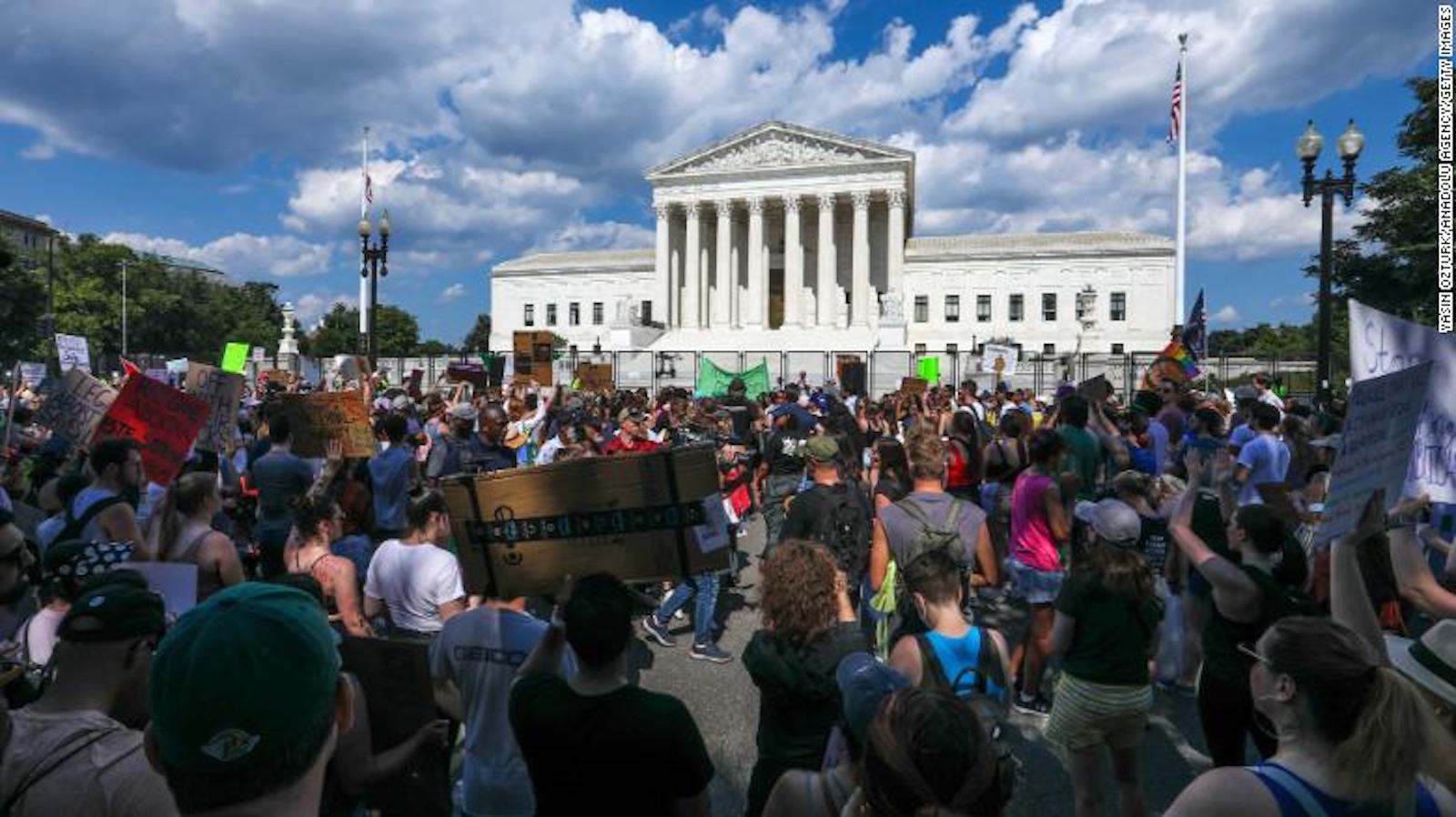
/cloudfront-eu-central-1.images.arcpublishing.com/prisa/3F3EHAP7NYDCD7NIOIZLOQJFPI.jpg)

/cloudfront-eu-central-1.images.arcpublishing.com/prisa/OCS7V4Q6YKB6UMI76BXPPNGQJE.jpg)

